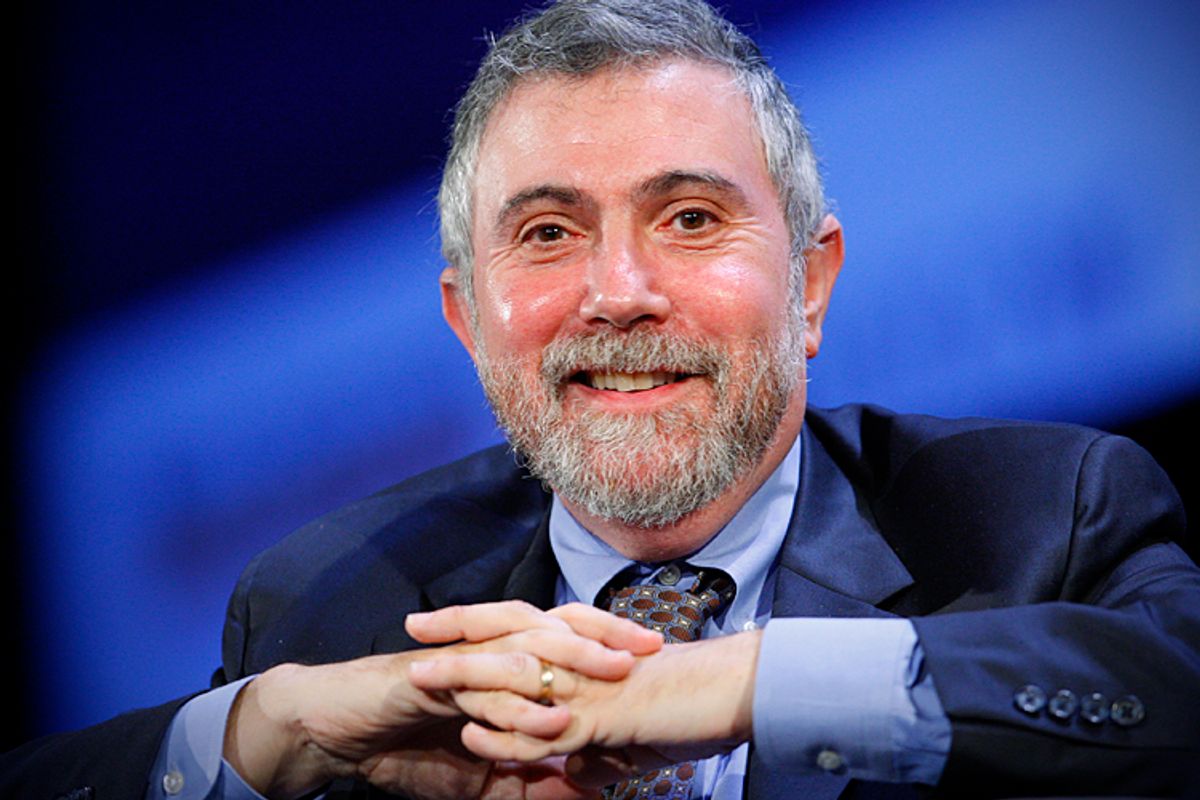In his latest for the New York Times, award-winning economist and influential liberal pundit Paul Krugman mocks Republicans for what he calls a "muted and unfocused" response to the new carbon regulations recently announced by the Environmental Protection Agency.
"I mean, these are the people who managed to create national outrage over nonexistent death panels," Krugman ponders. "Now the Obama administration is doing something that really will impose at least some pain on some people. Where are the eye-catching fake horror stories?"
Even if they're weak, Krugman says, it's worth rebutting what few criticisms from the right he's heard thus far. "[T]he attacks on the new rules mainly involve the three C’s: conspiracy, cost and China," Krugman writes. "That is, right-wingers claim that there isn’t any global warming, that it’s all a hoax promulgated by thousands of scientists around the world; that taking action to limit greenhouse gas emissions would devastate the economy; and that, anyway, U.S. policy can’t accomplish anything because China will just go on spewing stuff into the atmosphere."
Krugman writes that he's not particularly interested in countering the conspiracy charge, seeing it as just another sign of "the Republican Party’s descent into madness." But he's more than happy to explain why the costs associated with the new regulations — as well as the possibility that China may decide not to follow the U.S.'s lead — aren't really that big of a deal.
On cost, Krugman says that whatever "pain" there is likely to be as a result of the EPA's decision isn't going to be too great — and, besides, the free market will likely come up with ways to cushion the blow. "Ask right-wingers how the U.S. economy will cope with limited supplies of raw materials, land, and other resources, and they respond with great optimism: the magic of the marketplace will lead us to solutions," Krugman writes. "But they abruptly lose their faith in market magic when someone proposes limits on pollution — limits that would largely be imposed in market-friendly ways like cap-and-trade systems."
And on China? Krugman says that the EPA rules would indeed not be enough to forestall disaster so long as China keeps pumping out carbon emissions. But he argues that the EPA's decision was a necessary step toward persuading the rest of the world to join with the United States to save the planet:
China is enormously dependent on access to advanced-country markets — a lot of the coal it burns can be attributed, directly or indirectly, to its export business — and it knows that it would put this access at risk if it refused to play any role in protecting the planet.
More specifically, if and when wealthy countries take serious action to limit greenhouse gas emissions, they’re very likely to start imposing “carbon tariffs” on goods imported from countries that aren’t taking similar action.Such tariffs should be legal under existing trade rules — the World Trade Organization would probably declare that carbon limits are effectively a tax on consumers, which can be levied on imports as well as domestic production. Furthermore, trade rules give special consideration to environmental protection. So China would find itself with strong incentives to start limiting emissions.
The new carbon policy, then, is supposed to be the beginning, not the end, a domino that, once pushed over, should start a chain reaction that leads, finally, to global steps to limit climate change. Do we know that it will work? Of course not. But it’s vital that we try.

Shares